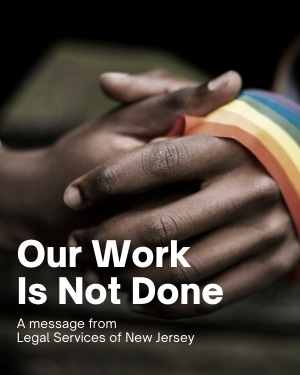 June 28th marks 52 years since violent police raids ignited the Stonewall Riots. This pivotal event gave rise to Pride Month, which commemorates the power and resistance of the LGBTQ+ protesters at Stonewall, and of the LGBTQ+ community at large against a long, persistent history of violence and discrimination. The most vulnerable and least recognized among the LGBTQ+ community—transgender women and gender-nonconforming folks of color, in particular—led the resistance at Stonewall, as they have so much of the LGBTQ+ rights movement more broadly.
More than 50 years later, during Pride Month, June 2021, a flurry of anti-trans legislation, from bathroom bills and pronoun laws to bills that criminalize medical care for trans youth and exclude trans girls from playing women's sports, further marginalizes an already vulnerable community. The Human Rights Campaign, which began tracking fatal violence against trans people in 2013, reports 2020 as the deadliest year yet; last year alone, 44 trans and gender-nonconforming people, the majority of whom were Black and Latinx women, were shot or killed by other violent means. And due to under- or mis-reporting, the number of trans lives lost may be even higher.1
The LGBTQ+ community continues to face systemic discrimination in housing, employment, healthcare, law enforcement, education, and more, leading to increased risks of poverty and a range of adverse mental and physical health outcomes—compounded and exacerbated by intersections with racism, sexism, ableism, and other intersecting systems of discrimination. Compared to an estimated 16% of heterosexual and cisgender folks, more than 1 in 5 LGBTQ+ individuals live in poverty. That rate is even higher for transgender adults (29%) and cisgender bisexual women (29%), and highest for Black (40%) and Latinx (45%) transgender adults.2 Same-sex couples raising children–often without explicit protection from discrimination—are twice as likely to live at the poverty line, and single LGBTQ+ parents are even more likely.3
Youth and elderly LGBTQ+ individuals also encounter unique challenges. LGBTQ+ youth are more likely than cisgender and heterosexual youth to experience homelessness, unstable housing, or foster care; in fact, an estimated 30% of youth in foster care and 40% of youth experiencing homelessness identify as LGBTQ+.4 The cumulative effects of systemic discrimination and the failure of government programs to meet the specific health needs of elderly LGBTQ+ individuals have led to increased risks of poverty, health disparities, and social isolation among this demographic; in particular, transgender elders, who experience high rates of family rejection, isolation, sexual violence, and discrimination from doctors, as well as invisibility and ignorance within medical research and practice, face the greatest barriers to healthcare access.5
As with other vulnerable and marginalized populations, the coronavirus pandemic took a particularly harsh toll on the LGBTQ+ community. Prior to the pandemic, LGBTQ+ people already faced significant economic and health disparities and stark gaps in health care coverage compared to their non-LGBTQ+ peers; during the pandemic, LGBTQ+ Americans have been more likely than the general population to live in poverty, work in strongly affected economic sectors, and lack access to quality medical care, paid medical leave, and other necessities.6
Covid-19 is not the first public health crisis to take a devastating toll on the LGBTQ+ community. The disparate death toll of the AIDS epidemic, particularly in its early stages, was exacerbated by reactionary anti-gay backlash, stigma, and government silence, including a press secretary who joked about the disease and a president who didn't speak the word "AIDS" until 1985, after more than 12,000 Americans had died.7 In the 1983 article “1,112 and Counting,” the gay activist and playwright Larry Kramer recounts “nights tormented by nightmares and visions of lost friends” and “days flooded by the tears of funerals and memorial services and seeing [his] sick friends,” asking “how many of us must die before all of us living fight back?”8
In the absence of the sort of massive government and public health investment in vaccines, testing, and prevention that we have seen during the coronavirus pandemic, the gay community came together to revolutionize care, treatment, and harm reduction during the AIDS epidemic. The powerful advocacy and protest of organizations like ACT UP (AIDS Coalition to Unleash Power) accelerated the federal government's response to the AIDS crisis, drew public attention to the deadly and disparate impact of homophobic public health policies, fought for expanded access to new and experimental testing and treatment methods, and, ultimately, saved lives.
While there are now highly effective treatments to prevent, halt, and reverse the progression of AIDS, they are neither accessible nor affordable to all, including those living in poverty or without access to quality, affordable healthcare. Today, the HIV/AIDS epidemic continues to inflict disproportional harm on vulnerable populations, including gay and bisexual men, people who inject drugs, people in prisons, sex workers, and transgender people.9 2016 CDC data shows that Black men who have sex with men, who experience intersecting vulnerabilities and significant barriers to testing, care, and treatment, are at highest risk—facing a 1 in 2 chance of contracting HIV in a lifetime.10
Even as Covid-19 restrictions ease around New Jersey and life begins to resume a sense of normality for some, this serves as a powerful reminder that once a crisis fades from the headlines, its impact often endures, lingering longest for the most vulnerable among us. Emerging from such crises requires we come together to demand remedies for all-- and, in doing so, employ culturally-specific strategies, account for intersecting vulnerabilities, and redress disproportionate harm.
Legal Services in New Jersey has for 55 years provided free legal services to the most vulnerable populations in New Jersey, including the LGBTQ+ community, on civil legal matters ranging from asylum to custody cases. We will continue to strive for equitable and full access to justice and services for all people.
1 https://www.hrc.org/resources/violence-against-the-trans-and-gender-non-conforming-community-in-2020
2 https://williamsinstitute.law.ucla.edu/wp-content/uploads/National-LGBT-Poverty-Oct-2019.pdf
3 https://www.americanprogress.org/issues/lgbtq-rights/reports/2020/10/06/491052/state-lgbtq-community-2020/
4 Ibid.
5 Ibid.
6 https://assets2.hrc.org/files/assets/resources/COVID19-IssueBrief-032020-FINAL.pdf?_ga=2.84883231.709487897.1594906965-1334882211.1594906965
7 https://www.nbcnews.com/feature/nbc-out/lgbtq-history-month-early-days-america-s-aids-crisis-n919701
8 Kramer, Larry. “1,112 and Counting” New York Native, 14-27 March 1983.
9 https://www.who.int/news-room/spotlight/why-the-hiv-epidemic-is-not-over
10 https://www.verywellhealth.com/why-50-of-gay-black-men-will-get-hiv-3896687
|